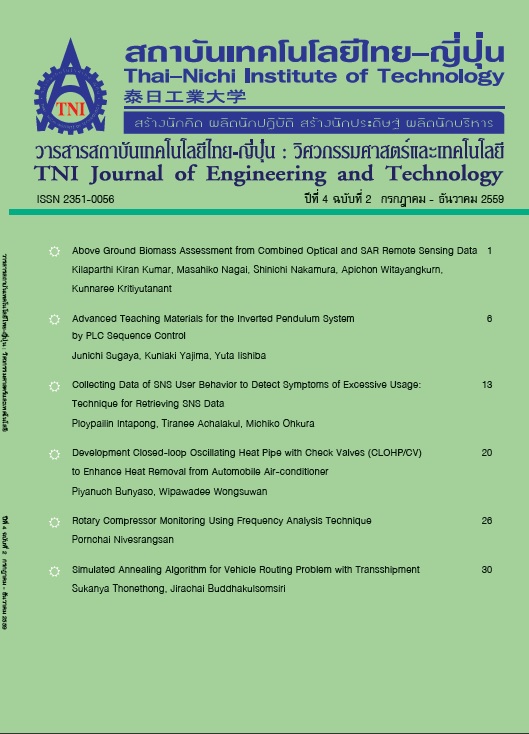The Optimization of an Electrical Accuracy of the AC Single Phase Electromechanical Meter using Box–Behnken Design
Main Article Content
Abstract
This paper presents the optimization model for an electrical accuracy of the AC single phase electromechanical meter. It is aimed to improve the electrical accuracy of the meter. Electrical accuracy of the electromechanical meter is important to the determination of electricity energy usages charged to the electricity consumers. The Response Surface Methodology, Box-Behnken Design, has been used to identify and determine the factors that affect electrical accuracy of an electromechanical meter. The experimental design starts with the identification of seven factors of interest. Eventually, four factors are proven to have effect on the electrical accuracy of an electromechanical meter. The optimal setting for each factor has been specified and the electrical accuracy has been raised to the required level.
It’s has been found that the electrical accuracy is depending on an error of meter’s disk rotation speed comparing to the specified revolution of meter. Improving the electrical accuracy can be achieved by reducing the error of meter’s disk rotation speed. The four identified factors are 1) the released screw distances to adjust electromagnetic fields, 2) the current coil diameter, 3) the winding cycles, and 4) the voltage coil winding cycles. The appropriate setting of these four selected factors can reduce errors of meter’s disk rotation speed significantly. The optimal settings for screw position 1, 2, 3 and 4 released distance levels should be -0.3, 0.2, 1 and -1, respectively. The current coil diameter level should be set at level -1. The winding cycle level should be set at level 1 and the voltage coil winding cycle level should be set at level 0.
Article Details
Article Accepting Policy
The editorial board of Thai-Nichi Institute of Technology is pleased to receive articles from lecturers and experts in the fields of engineering and technology written in Thai or English. The academic work submitted for publication must not be published in any other publication before and must not be under consideration of other journal submissions. Therefore, those interested in participating in the dissemination of work and knowledge can submit their article to the editorial board for further submission to the screening committee to consider publishing in the journal. The articles that can be published include solely research articles. Interested persons can prepare their articles by reviewing recommendations for article authors.
Copyright infringement is solely the responsibility of the author(s) of the article. Articles that have been published must be screened and reviewed for quality from qualified experts approved by the editorial board.
The text that appears within each article published in this research journal is a personal opinion of each author, nothing related to Thai-Nichi Institute of Technology, and other faculty members in the institution in any way. Responsibilities and accuracy for the content of each article are owned by each author. If there is any mistake, each author will be responsible for his/her own article(s).
The editorial board reserves the right not to bring any content, views or comments of articles in the Journal of Thai-Nichi Institute of Technology to publish before receiving permission from the authorized author(s) in writing. The published work is the copyright of the Journal of Thai-Nichi Institute of Technology.
References
K. Siha, W. Ramanggoon, and S. Phannongsaen, “The Design and Built of the Aluminium Separator using Eddy Current Theory,” B. Eng. thesis, Khon Kaen University, Khon Kaen, Thailand, 2009.
Assumption University Alumni Association, “The truth of Electricity Energy Meter,” 2013. [Online].
Available:https://www.ac108.com/forum_thai/index.php?topic=769.
Thailand Industrial Standard Institute (TSI), “Electricity Metering Equipment (AC) – Particular Requirements – Electromechanical Meter For Active Energy Meter (Class 0.5, 1 and 2),” TIS2336-2552.
P. Sudasana Na Ayudthaya and P. Luangpaiboon, Design and Analysis of Experiments. Bangkok, Thailand: Top, 2008.
D. C. Montgomery, Design and Analysis of Experiments, 8th ed. Hoboken, NJ: Wiley, 2012.


